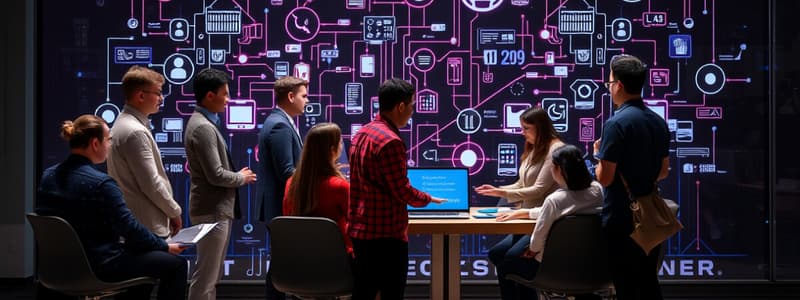Podcast
Questions and Answers
What is the primary focus of a digital mindset in organizations?
What is the primary focus of a digital mindset in organizations?
- To enforce foreign work practices on the workforce
- To maintain traditional business practices in a digital environment
- To implement the latest technology trends without context
- To continually explore digital technology's potential for relevance (correct)
Why is it crucial for leaders to adopt a digital mindset?
Why is it crucial for leaders to adopt a digital mindset?
- It aligns the organization solely with current technology trends
- It fosters a culture of collaboration in navigating digital changes (correct)
- It guarantees immediate success in all digital ventures
- It isolates decision-making from employee experiences and needs
What misconception should leaders avoid when implementing digital and IT strategies?
What misconception should leaders avoid when implementing digital and IT strategies?
- Thinking that technology implementation requires no collaboration
- Assuming that technology changes are only affecting their organization (correct)
- Believing that a digital mindset is only necessary for top management
- Believing that adapting to change means abandoning traditional practices
How do successful digital organizations view leadership?
How do successful digital organizations view leadership?
What characterizes a growth mindset in relation to digital transformation?
What characterizes a growth mindset in relation to digital transformation?
What is the primary focus of relationship management for digital leaders?
What is the primary focus of relationship management for digital leaders?
Which of the following is a key benefit of ongoing education for digital leaders?
Which of the following is a key benefit of ongoing education for digital leaders?
In the context of self-education, what should digital leaders primarily focus on?
In the context of self-education, what should digital leaders primarily focus on?
What role should digital leaders assume when educating their peers?
What role should digital leaders assume when educating their peers?
Why is it crucial for digital leaders to evaluate emerging technologies?
Why is it crucial for digital leaders to evaluate emerging technologies?
What is NOT considered a part of the relationship management practice according to digital leadership principles?
What is NOT considered a part of the relationship management practice according to digital leadership principles?
How should digital leaders communicate about new technologies to stakeholders?
How should digital leaders communicate about new technologies to stakeholders?
What is a key role of leaders in facilitating organizational change?
What is a key role of leaders in facilitating organizational change?
Which statement best reflects the approach digital leaders should take regarding innovation?
Which statement best reflects the approach digital leaders should take regarding innovation?
How do effective leaders create a culture of psychological safety?
How do effective leaders create a culture of psychological safety?
What should leaders do to promote the desired cultural changes within an organization?
What should leaders do to promote the desired cultural changes within an organization?
What communication strategy is essential for digital leaders?
What communication strategy is essential for digital leaders?
What is a common misconception regarding the hiring process for digital leaders?
What is a common misconception regarding the hiring process for digital leaders?
Why is measuring productivity evolving in the context of digital leadership?
Why is measuring productivity evolving in the context of digital leadership?
What should digital leaders avoid when driving organizational change?
What should digital leaders avoid when driving organizational change?
Study Notes
Digital Leadership Overview
- Leadership in digital organizations focuses on defining and executing digital and IT strategies for ongoing business relevance.
- Effective digital leaders require a transformative mindset, culture, and organizational capabilities.
Digital Mindset
- A digital mindset involves continuous exploration of digital technology possibilities to enhance organizational relevance.
- Leaders must understand societal changes driven by technology and collaborate on innovative solutions, avoiding changes for mere trend compliance.
- A successful digital organization supports a human-centric leadership approach, promoting vision creation and empowering teams.
- Leaders should foster a culture that encourages challenging the status quo, while understanding that change requires time and cultural alignment.
- Measurement of productivity should transition from output quality to outcome achievement, emphasizing trust and psychological safety within teams.
Communication
- Exceptional communication skills are vital, enabling leaders to articulate the digital strategy across all organizational levels.
- A comprehensive communication strategy should be formed, including stakeholder updates tailored to their specific needs.
- Leaders must actively obtain feedback and remedy misunderstandings to ensure clarity and compliance with digital initiatives.
- Showcasing outcomes instead of mere performance metrics helps illustrate team and organizational successes.
Relationship Management
- Relationship management is essential for collaboration amidst extensive changes from digitization.
- Leaders should facilitate shared goals, no-blame cultures, and continual learning, while setting transparent communication guidelines.
- Effective relationship management connects enterprise-level strategy to individual operational objectives.
Education and Learning
- Ongoing education is critical for digital leaders to keep abreast of changes, industry trends, and potential technology use cases.
- Leaders should foster a culture of learning, facilitating awareness of new technologies and their applications among all stakeholders.
- Digital leaders must also self-educate continually, leveraging diverse resources to enhance their and their teams' digital fluency.
Evaluating Emerging Technology
- Digital leaders must assess technologies and industry trends for potential organizational threats and opportunities.
- Understanding the organization’s architecture, business model, and operating model is crucial for effective evaluation.
Agile Management Techniques
- Agile methodologies enable faster market responses and innovation management, blending design and production cycles.
- Leadership in agile environments requires a shift toward cross-functional collaborations and a focus on value delivery.
Strategic Metrics
- Strategic metrics, emphasizing outcomes, assess the relevance of organizational strategies and the success of initiatives.
- Moving beyond traditional performance-based metrics allows leaders to gauge the overall effectiveness of strategic goals.
Orchestrating Diverse Environments
- Digital leaders must cultivate collaboration across the diverse skill sets and technologies within their organizations.
- Embracing diversity in people, technologies, and disciplines bolsters the organization's ability to achieve objectives.
Operationalizing Strategy
- Leaders act as visionaries and pragmatists, balancing imaginative possibilities with practical application to achieve objectives.
- Navigating uncertainty is part of a digital leader’s role, requiring adaptability and a supportive reward system for innovation.
Business and Technology Management Skills
- Digital leaders must blend business acumen with technological knowledge to be effective organizational leaders.
- Understanding finance, marketing, operations, security, and leading frameworks (ITIL 4, Lean, Agile, DevOps) is essential for successful digital leadership.
- Emphasizing conscious leadership development is important for cultivating the necessary skills in a rapidly evolving digital landscape.
Studying That Suits You
Use AI to generate personalized quizzes and flashcards to suit your learning preferences.



